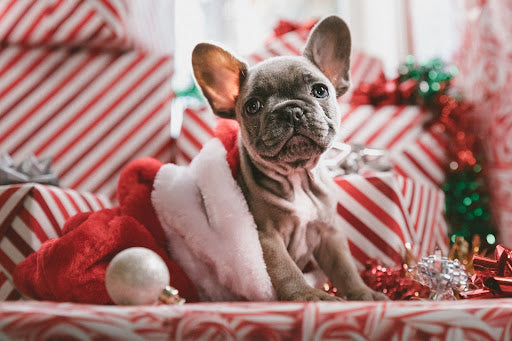
How To Celebrate Christmas With A Dog
Share
How Can I Celebrate Christmas With My Dog?
If you celebrate Christmas, you’ll know it’s a special family holiday and you want to celebrate it with those you love most.
For many dog owners, that means more than just having your pet around in your home during the festive season.
You’ll likely want to find ways to involve them in the fun and magic of Christmas so they can share that special time and create memories with you - just like any other family occasion.
But how do you celebrate Christmas with a pet? What’s the best way to involve them? And are there any Christmas holiday no-nos when it comes to pets?
We’ve put together a quick guide to celebrating Christmas with a dog in the house, so you can be extra prepared when it next rolls around!

What You Need To Know About Christmas With Dogs
The most important thing to remember during the festive season is that your dog simply won’t have a real understanding of what is going on around them - but that doesn’t mean they won’t be affected.
Of course, we don’t expect them to understand what the festivities are all about, but they will certainly pick up on the fact that some major changes are taking place.
It’s worth bearing in mind that dogs have a very highly developed sense of smell that is far superior to ours. That means that smells we may only slightly notice or not even register at all will be extremely obvious to them.
Unknown smells can be a source of stress and cause over-excitement or anxiety. Your dog will be frantically trying to discover a) the source of the smell and b) whether or not this new smell has a positive or negative meaning.
Unfamiliar smells can include candles, seasonal foods, decorations like wreaths and floral displays, and even your Christmas tree.
Another potential source of stress can be changes to your pet’s daily routine (for example, if you always take them for a walk first thing in the morning but this changes over Christmas because you have family over).
Additionally, unfamiliar objects and people can be confusing for animals, so bear this in mind and give your pet plenty of time to adjust.
Younger dogs and recently adopted pets may be more susceptible to stress during the holidays, as older dogs who have experienced many Christmases with you before will have already been exposed to these experiences.
It’s also worth noting that adopted dogs may have negative associations with Christmas smells, sounds, or objects due to abuse by previous owners, so it’s always safest to expect your dog to feel nervous or unsure at first.

How Can I Help My Dog Enjoy Christmas?
As you can see, there are plenty of aspects to this holiday season that we see as exciting and magical, but that our pets may well see as frightening and confusing.
The good news is that there are steps you can take to protect your dog and help them feel as relaxed as possible at Christmas.
1. Take note of the changes.
The first thing you can do to support your dog is recognize that they will not experience Christmas in the same way you do.
Your pet likely loves their predictable routine and they feel safest in their home, where everything is familiar.
Before you consider making any changes during this time (including to routine, items in the home, and guests coming into your home), make sure you consider how they will affect your dog.
This doesn’t mean you can’t celebrate Christmas exactly how you’d like to. It just means that thinking about it in advance will help you be more aware of how your dog is coping with the changes, and better prepared to support them if they do appear to be struggling.
2. Make guests and family members aware.
Another way to help dogs at Christmas is to ensure that everyone who lives in your home and any guests who will be joining you during this time are fully aware of your dog’s needs and personality.
If your dog is quite anxious with unfamiliar people, let guests know in advance so that they can enter the home in a non-threatening way and give your pet time to adjust.
Explain to adults and older children how your dog likes to be treated (e.g. favorite games, preferred way to be petted, the signals they give when they have certain needs).
Younger children will need to be supervised carefully to ensure they do not interact too roughly with your dog or otherwise bother them too much.
3. Introduce changes gradually.
If at all possible, it’s best to make changes to your dog’s environment slowly over time, so that they can have plenty of time to adjust.
This doesn’t mean putting up the decorations six months in advance!
But if you can, for example, put up the Christmas tree a week before you put up fairy lights all around the house (rather than all at the same time), that will be less of a shock for your dog if they are particularly sensitive.
Put yourself in your dog’s shoes (if they had any). Imagine you go out for a nice country walk and return to find your home looking, smelling, and even sounding completely different! That would be pretty disturbing, right?
That’s why it’s best to take your time as much as you can - your dog will thank you.

How To Involve Your Dog In Christmas
Now that we’ve looked at the keys to taking good care of dogs at Christmas, let’s explore some fun ways to enjoy this magical time with your furry friends.
After all, we want it to be fun for them too, right?
1. Take a Christmas walk after dark.
If you live in a part of the world where Christmas falls at the coldest and darkest time of year, make the most of this by taking your dog for an early evening walk to enjoy the sights and smells of Christmas.
Your dog will likely love the beautiful Christmas lights on display in your neighborhood. Just be aware that some decorations, such as those that move or represent people and animals, can provoke mixed reactions from dogs.
If your dog is not a fan of any decoration in particular, be sure to steer them in a different direction next time you take a walk together.
2. Take some cute holiday photos.
Some dogs love the attention they get from dressing up and posing for photos. Others simply find it irritating or boring.
Regardless of your pet’s personal preferences, take the opportunity to take photos of them - even if they are candid in-action shots rather than the beautifully posed portraits you had in mind!
3. Plan quality time together.
In the busyness of the season, it can be difficult to make time to just enjoy being with your pet. If you are normally at home a lot, your pet may miss having the one-on-one time they are used to.
To counteract this, plan quality time with your dog into your schedule. Block out that time in your calendar and be intentional about how you spend that time.
In other words, resist the urge to make phone calls or get some housework done. Instead, play your dog’s favourite games with them, or sit on the couch and enjoy some cuddles.
4. Give your dog thoughtful gifts.
Whilst your dog won’t hold it against you if Santa misses them off his list this year, having some gifts to give to them on Christmas day is a great way to show you care.
Novelty outfits and other seasonal items can be fun, but take a moment to think about what your dog would really like most.
A new bag of his favourite treats, an exciting squeaky toy or a stimulating puzzle game are all good options.
You don’t need to spend a fortune, either. Many owners will know that it’s often the most low-budget, last-minute purchases that end up becoming their pet’s favorite toy.
We hope this guide to involving your dog in Christmas helps you to get the most out of the holidays with your pet.
If your dog is prone to anxiety or hyperactivity, we recommend a high-quality dog calming treat that will naturally help your dog to relax.
You can find out more about our natural and 100% drug-free Dog Calming Chews here.
